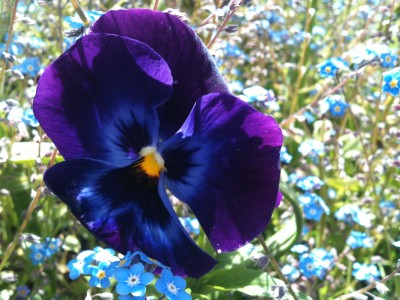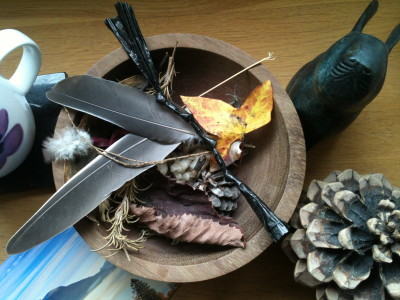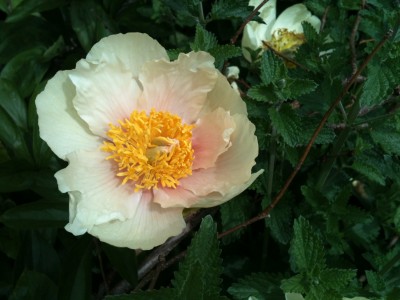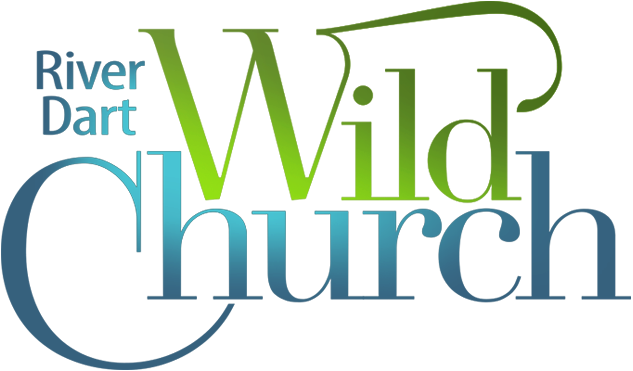
Today is Pentecost and although it’s still a fortnight until our Wild Church summer camp, this weekend is the beginning of my own wild journey into Pentecost for this year. I’m loving Maytide, this Spring season of natural abundance and beauty with hawthorn in the hedges and fresh salad in the garden. Dartington is full of flowers and the mornings are rich with bird song and last night a bright, waxing crescent moon was tucked up among the new leaves on the oak tree. Walking in the early summer sun today, the air was full of soft, silky down of willow seeds ascending…
My Pentecostal weekend began yesterday with a small peer meeting at Gail and Ian Adams‘ lovely home, close to the river in Aveton Gifford, where we were welcomed with breakfast and poetry from Mary Oliver, including the following:
The Summer Day
Who made the world?
Who made the swan, and the black bear?
Who made the grasshopper?
This grasshopper, I mean-
the one who has flung herself out of the grass,
the one who is eating sugar out of my hand,
who is moving her jaws back and forth instead of up and down-
who is gazing around with her enormous and complicated eyes.
Now she lifts her pale forearms and thoroughly washes her face.
Now she snaps her wings open, and floats away.
I don’t know exactly what a prayer is.
I do know how to pay attention, how to fall down
into the grass, how to kneel down in the grass,
how to be idle and blessed, how to stroll through the fields,
which is what I have been doing all day.
Tell me, what else should I have done?
Doesn’t everything die at last, and too soon?
Tell me, what is it you plan to do
with your one wild and precious life?
So it begins… an entering into communion as we share food, share conversation and poetry read aloud together, each taking a line. I read “I do know how to pay attention, how to fall down” and I’m back with Jesus falling like a seed onto the earth on his crucifixion journey and then rising up like the green shoots of spring on Easter day… and then come my memories of ascension, which become woven in to the rising willow seeds and Jan telling us about her meetings with people of Rwanda and being moved by their post-genocide commitment to both ‘remember and renew’. I think this is how the seasons of the spirit work for me as a spiritual practice: by paying attention to the seasons and rhythms of the natural world, together with participating in the story of Jesus (among other stories), I experience and share a remembering and renewal, a continual reawakening to this wild and precious life.
After breakfast we walk out for what Ian calls Terra Divina, journeying together along the river, past small crabs and big, fierce swans and into the woods with their unfurling ferns and communities of bluebells. We practise opening our hearts and minds and senses to how the spirit is speaking to us through paying attention to where we are and so ‘receiving the gift’ as Gail and Ian beautifully describe it. In Wild Church and Open Spirit we similarly apply the ancient art of Lectio Divina (divine reading), traditionally practised with (what the celtic christians called the ‘small book’ of) scripture, to the ‘big book’ of the natural world. I think of it as a way of ‘practising the presence of God’, of bringing to life a Christ-like kind of love and tender awareness.

Making a close reading of the sacred book of the natural world is another participation mystique, an entering into intimate relationship. So we walk in silence and then pause to meet each other and share reflections. It’s always fascinating to hear the different experiences and the meanings each of us has drawn from them. In the first two stages of lectio and meditatio, of reading and reflecting, though surrounded by new life, I became unexpectedly aware of rot and rubbish, from strips of black bin liner lying in the mud, to compost heaps and decaying buildings. I’m pondering again Jesus’ crucifixion and resurrection, the Rwandans’ remember and renew, established and emerging church and all these many forms of change and transformation that challenge me to hold together apparent opposites. I’m thinking about my own experiences of loss, rape and war trauma, my own struggles to both hold the remembering and allow healing and renewal. In the third stage of oratio or prayer, I start to create a rubbish rosary, tying prayer bead knots into my strip of black bin liner, weaving together words and images which circle around the beautiful pattern of the grain in some weathered wood in the window of a tumbledown building on the edge of the woods, surrounded by drifts of pink purslane, until simple stillness unfolds in the fourth and final stage, contemplatio, just being. I realise that this is how I feel… battered, kind of beautiful and bizarrely living on the edge, alone and yet alongside others.

Today, Sunday, I’ve been walking to a traditional Pentecost service at Dartington Church. Walking is the beginning of celebration, in the scent of rowan blooming, in the sharp and bitter taste of young beech leaves picked from the Hunters Moon hedges… Today folks are setting up for a food fair in the Shops at Dartington as I pass through, between one man playing an electric double bass and another holding a huge eagle owl.
Inside the cool stones of traditional Church, by late May it is now possible to sit through a service without becoming chilled to the bone. The liturgy washes over me and it’s like being in the woods as certain words and phrases suddenly become the gift, like a sudden shining celandine in the shadow of the trees. The reading from Acts 2, of the disciples receiving the Holy Spirit, starts ‘they were all together in one place’ and I suddenly hear this not only as being about the importance of community but about the gathering together of oneself in meditation, like Mary Oliver’s ‘paying attention’, the Benedictine stabilitas or the Buddhist ‘taking the one seat’. I have to remember this over and over, that when I settle into an inner stillness, I come into alignment with spirit and become able to express myself (in word and deed) with more love and honesty. Also that hearing holy spirit speaking in own’s own language is a wonderful affirmation that this is the real nature of ‘being spiritual’, that it’s not achieving some external ideal but a falling into the uniqueness of oneself. I feel again for a while, free to be, to live this moment’s expression of my one wild and precious life.
